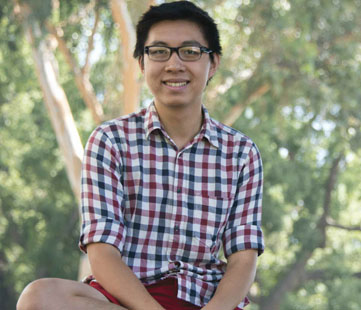When he started thinking about college, Johnny Huynh ’14 had two goals—to leave his hometown of Claremont and to attend a large research university. That all changed after a weekend visit to Pomona, where he says he “fell in love with the College.” A first-generation college student and son of Vietnamese immigrants, Johnny balances a demanding academic schedule as an economics and mathematics double major with weekly outings to Pomona’s Organic Farm, where he can practice the gardening skills he learned from his mom.
It All Starts With Lunch
“Before I came here, I thought that having lunch with professors was just a marketing spiel—I figured they had their research and classes and wouldn’t have time to talk to students. I was really surprised. I’ve had lots of dinners and lunches with professors. I think it complements your learning, and because you know them, you’re not afraid to ask questions.”
 Digging Deeper
Digging Deeper
“I was really motivated by a course on labor economics I took with Professor [Michael] Steinberger and approached him about doing summer research. The project we worked on was evaluating a specific conditional cash transfer (CCT) program in Malawi that targets schoolgirls 13 to 22 years old. CCTs are welfare programs, mostly in developing countries, that distribute cash to families to encourage more schooling and to increase test scores. The current literature finds that on average the conditional cash transfers are more effective than unconditional transfers, but what the research hasn’t looked at yet is the heterogeneity—whether some students respond differently than others.”
Changing the Equation
“What we found when we crunched recent data from the World Bank is that the subsidies are more effective at increasing attendance to the 80 percent benchmark if a student is already attending at high rates of schooling, say, 70 percent or more. Raising attendance from 10 to 80 percent is much harder, because so many children from poor families have to work. Giving that up to attend school means a lot of lost income for their families. “One of the things we’re proposing as a way to improve educational opportunities for these students is that the threshold for attendance be lowered from 80 to 50 percent. Another alternative would be to increase the cash subsidy to offset the income these girls would be giving up to be students.”
Learning to Roll With the Punches
“As a researcher, you can’t anticipate what you’re trying to find. If you’re looking through the data or building a theoretical model, the outcome might be different from what you expected, so you have to learn to change gears and roll with the punches. You’re not entirely sure what you’re going to write about because it’s new research, something no one has ever done before. It’s difficult, but it’s really, really rewarding.”
Not Just Theoretical
“Both my parents were immigrants from Vietnam, and neither of them attended high school, let alone college. They both still work for the minimum wage, and our housing is subsidized. Being on welfare affects me personally as well as theoretically, and I think it’s valuable to have a perspective that a lot of researchers don’t have, especially when it comes to public policy programs and finding out which ones work and which ones fail.”
A Message to Pomona
“Thank you, thank you, thank you. That’s the first thing I would say. That dominates everything else. I’m grateful I had the chance to come here, and that Pomona does so much to help students in need. After I graduate, I’d like to somehow help reform the social safety net, so other people can get the help they need to succeed.”
Strengthening Summer Research
Johnny Huynh ’14 was among the more than 220 Pomona College students who spent last summer conducting research on topics ranging from organic solar cells to Joseph Haydn’s keyboard sonatas. About 80 percent of the students were supported by the College’s Summer Undergraduate Research Program (SURP), which provides funding for up to 10 weeks of collaborative research in the natural sciences, social sciences, arts and humanities.
Expanding and strengthening summer research is one of the goals of Campaign Pomona: Daring Minds. Since the start of the campaign, the number of students participating in supervised summer research has grown by about 26 percent, thanks in part to 20 new endowed and expendable funds established by foundations, alumni and other donors. The funding is critical to the program, permitting students of all income levels to take part without sacrificing summer income.
Economics Professor Michael Steinberger, who worked with Huynh last summer, says the grants “help brilliant students, like Johnny, to spend the summer producing high-quality research. Instead of trying to find time to research while working another job, Johnny was able to focus entirely on our project. He learned a lot about the process of research, and I learned some new econometric techniques while working with him.”
While much of the research was conducted on campus, students also traveled across the country to work in labs at Tufts University in Boston and the National Center for Atmospheric Research in Boulder, Colo., and to conduct research in 14 countries, including Sweden, India, China and Chile.
In September, students lined Stover Walk to present the results of their research to the College community at the 26th annual SURP poster conference. For some of these students, their projects will develop into senior theses or continue on as the basis for co-authored papers with faculty and presentations at local and national conferences.
“Johnny’s supported summer research will be essential to help him get into a high-tier graduate school,” says Steinberger. “I expect our project will place in a top journal, and I’m excited for the real-world policy implications of our findings.”
